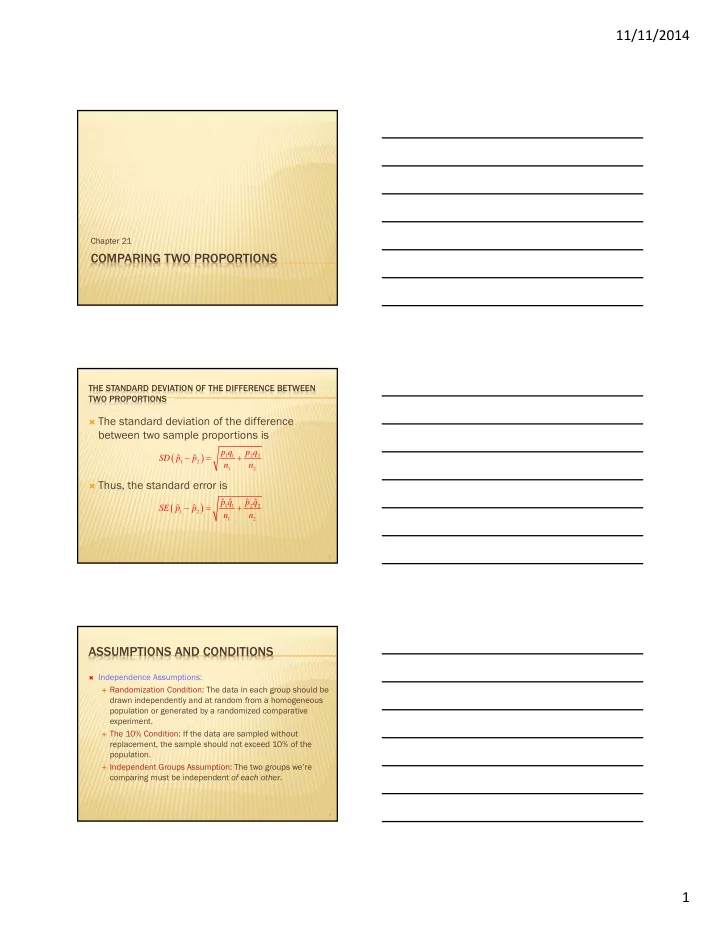

11/11/2014 Chapter 21 COMPARING TWO PROPORTIONS 1 THE STANDARD DEVIATION OF THE DIFFERENCE BETWEEN TWO PROPORTIONS The standard deviation of the difference between two sample proportions is p q p q 1 1 2 2 SD p ˆ p ˆ 1 2 n n 1 2 Thus, the standard error is p q ˆ ˆ p q ˆ ˆ SE p ˆ ˆ p 1 1 2 2 1 2 n n 1 2 2 ASSUMPTIONS AND CONDITIONS Independence Assumptions: Randomization Condition: The data in each group should be drawn independently and at random from a homogeneous population or generated by a randomized comparative experiment. The 10% Condition: If the data are sampled without replacement, the sample should not exceed 10% of the population. Independent Groups Assumption: The two groups we’re comparing must be independent of each other . 3 1
11/11/2014 ASSUMPTIONS AND CONDITIONS (CONT.) Sample Size Condition: Each of the groups must be big enough… Success/Failure Condition: Both groups are big enough that at least 10 successes and at least 10 failures have been observed in each. 4 THE SAMPLING DISTRIBUTION Provided that the sampled values are independent, the samples are independent, and the samples sizes are large enough, the sampling distribution of is modeled by a p ˆ p ˆ 1 2 Normal model with Mean: p p 1 2 Standard deviation: p q p q ˆ ˆ 1 1 2 2 SD p p 1 2 n n 1 2 5 TWO-PROPORTION Z -INTERVAL When the conditions are met, we are ready to find the confidence interval for the difference of two proportions: The confidence interval is ˆ ˆ ˆ ˆ p p z SE p p 1 2 1 2 where p q ˆ ˆ ˆ ˆ p q 1 1 2 2 SE p ˆ p ˆ 1 2 n n 1 2 The critical value z * depends on the particular confidence level, C , that you specify. 6 2
11/11/2014 TWO-PROPORTION Z -TEST The conditions for the two-proportion z -test are the same as for the two-proportion z -interval. We are testing the hypothesis H 0 : p 1 = p 2 . Because we hypothesize that the proportions are equal, we pool them to find Success Success ˆ pooled 1 2 p n n 1 2 7 TWO-PROPORTION Z -TEST We use the pooled value to estimate the standard error: p ˆ q ˆ ˆ p q ˆ pooled pooled pooled pooled SE p ˆ p ˆ pooled 1 2 n n 1 2 Now we find the test statistic: p ˆ p ˆ 1 2 z SE p ˆ p ˆ pooled 1 2 When the conditions are met and the null hypothesis is true, this statistic follows the standard Normal model, so we can use that model to obtain a P-value. 8 3
Recommend
More recommend